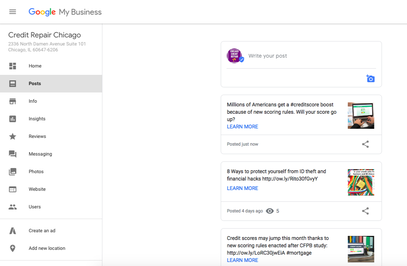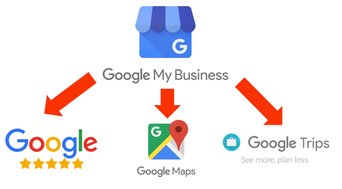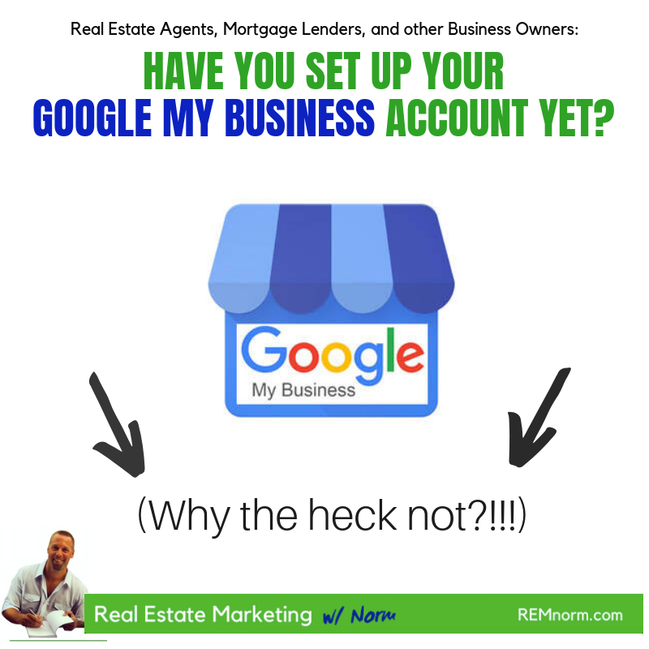 Back in the day (which was only about 15 years ago before most marketing migrated online), it took a lot of legwork to become a local expert – literally. Realtors walked the neighborhood and knocked on doors, introducing themselves, hosted open houses in the area, and sent out (expensive) postcards to a "geographic farm." These days, there's a much more efficient path to becoming a neighborhood expert and dominating your local market, whether you're a Realtor, mortgage lender, insurance agent, chiropractor, or any business owner. To get started, I've made a list of ways you can do just that - largely utilizing the internet to reach large numbers of people in your target area and convert them into followers then clients. Here are 25 ways to become a neighborhood expert and dominate your local market: 1. Of course, a great place to start is a monthly blog or graphic that covers the real estate and housing market for the area, with key stats like median prices, days on market, price per square foot, the number of listings, and if those numbers are trending higher or lower since the previous month or year. 2. You can also create a fact sheet for buyers that are new to the area, with info about schools (just no school rankings or qualitative data), local parks, community centers, hospitals, and utility providers so they can easily get services like water, trash, electric, cable TV and Wi-Fi turned on. 3. Self-publish a short neighborhood guide, handbook, special report, or checklist on Amazon.com and iBook. (SUPER opportunity!) 4. Write up your own top-10 list for:
By the way, a great way to set these up so that no one is #1, #10, etc. and feels put off or offended is just listing the top 10 alphabetically. 5. Write about any interesting facts or trivia about the neighborhood. 6. You should also definitely cover the history of the area or specific neighborhood as far back as you can find it, and people LOVE historic photos! 7. Document the economic data for the area, such as employment stats, the percentage of white vs blue collar jobs, the largest industries, biggest employers in the region, etc. 8. Produce a blog post that shows interesting and fun maps for the neighborhood (such as a hand-drawn map that highlights the best coffee shops, restaurants, and other amenities). 9. Highlight the Neighborhood Watch (without getting into crime statistics). 10. Do a Back-To-School or graduation special post or blog for neighborhood schools. 11. Email out a newsletter with community information, that weekend’s happenings, and fun events. 12. Write up a quick profile on a referral partner or other business that is well-established in the area. By getting them on board and sharing it with their followers, too, you'll instantly get name recognition with an exponentially larger audience - and earn their thanks! 13. Create a profile on the public parks in the area. 14. Go into the farmer’s markets and health and fitness options in the area, like a profile on golf courses, the best gyms, etc. 15. Write up a holiday calendar. 16. Start your own hashtag or Facebook or Instagram page for the neighborhood – not just for you. 17. You can also post a local interest photo and ask people to submit a funny caption or hashtag it. 18. Run a weekly contest or raffle with a neighborhood angle. 19. Cover special events like block parties, parades, concerts in the park, festivals, fairs, etc. 20. Make a fun post about your “Perfect Weekend” in the neighborhood, with all of the places you’d go, establishments you’d dine or drink in, etc. 21. Cover any local pro athletes, celebrities, or other notable people that either are from the area or live there now. Document the different types of architecture and design elements you find in that neighborhood (works best in older areas). 22. Do you have a local radio show, TV station, magazine or community newspaper? Create a profile about them (and ask about a free ad in exchange for the promotion!). 23. Interview or profile on the police chief/police force. 24. Interview or profile the local Assemblyman, politician, or even the Mayor! 25. Of course, you can also set up a weekly email or post(s) that highlight the nicest and best homes for sale (in your estimation) in the area, promote any open houses (if you’re a lender, or listings with your same brokerage if you’re a Realtors). Even if they aren’t your listings, you can sure attract buyers that are interested in that neighborhood! *** I hope that these prove helpful! If you need any help getting started on these ideas or have a great idea of your own you’d like to share, please hit me up at [email protected]! -Norm :-)
0 Comments
As the top search engine in the world, Google drives more traffic than any single source, responsible for about 75% of all search queries in the U.S. today - including when consumers look for a local Realtor, mortgage lender, or any business. Google has been around almost as long as there's been an Internet, but it has a relatively new platform that can do some pretty incredible things when it comes to expanding your reach and presence online. (We're not talking about Google+, which is dead as disco!) I’m referring to the Google My Business page feature on – you guessed it – Google. As a real estate agent, getting your NAP (name, address, phone numbers, etc.) as well as brokerage name, the area you serve, email address, and website, etc. are crucial, and Google My Business will help you do that – and way more. And the best part is that very few Realtors and loan officers are bothering to use it yet, so you have a window to be ahead of your competition. In fact, having (and using) a Google My Business listing can:
The best part is that it’s free! However, it does take a little bit of time and know-how to do it correctly (you don't want to just use your home address, but set up your business as a solo practitioner at your brokerage address, etc.) so contact me if you need helping setting it up quickly and inexpensively. Ok, let’s dig into the features and benefits of Google My Business: What is Google My Business? Google My Business is a convenient tool for businesses, organizations, and even real estate agents to organize, catalog, and promote their online presence across the Google universe. That includes syncing Google search, Google Maps, and more. You can find the portal to get started at Google.com/business. The powerful benefits of Google My Business: By setting up and using Google My Business correctly, you’ll make it far easier for potential clients to find you, forums to connect with them directly, and ways to measure and optimize those interactions.  One of the main benefits, of course, is that your business will show up right when people are searching for your services or similar business in your area. For Realtors, that may mean that when people search Google for "Real estate agents in East Sacramento" or "Buy a home in San Jose,” your business will appear in the search, complete with all the information you want them to have right at their fingertips – your name, phone number, website, email and even a flag on the Google Map. Amazing! Since a Realtor's business is hyper-local (you don't care about showing up for home sale searches in Kansas, or even Los Angeles, if you're a real estate agent in Sacramento), Google's Google My Business (let’s call it GMB to save my typing finger) is a powerful and focused tool – and one that gives you a competitive edge over the 98% of other real estate salespeople who aren't using it.  Here is some information that GMB will document and share across all Google platforms: • Phone number • Website URL • URL to make an appointment • Business hours • Address (Again, this can be tricky for Realtors, but there's a correct way to do it.) • Locations • Categories • Company Logo • Profile Photo • Internal and external photos • Virtual Tour (if applicable) • Videos • Other social media links All of these tools will be at your disposal – and more with their advanced function. It's no wonder why an estimated 39% of local retailers and walk-in businesses have already claimed and verified their Google My Business listing. Do you need more convincing? In part two of this blog, we’ll bring you information about these 10 benefits of having a Google My Business page: 1. Your Google listing will attract a new audience via Google Search. 2. Your business will pop right up in Google Maps. 3. Easily manage your business information. 4. Gain reviews - and answer them directly. 5. Write and share Google posts. 6. Access user insights and search analytics. 7. Get a free Google website! 8. Offer specials, promotions, special discounts, etc. 9. Enjoy their Question & Answer feature. 10. Direct message your audience and potential clients. Tune in for part two coming soon, or email me if you'd like help setting up your Google My Business listing. |
Categories
All
Archives
December 2020
|
Get in touch: |



 RSS Feed
RSS Feed
